新课标英语必修2第一单元语法课时
高中英语必修二教案

高中英语必修二教案【篇一:人教新课标高一英语必修2_unit_1教案】unit 1cultural relicsi. 单元教学目标ii. 目标语言ii. 教材分析与教材重组1. 教材分析本单元以cultural relics为话题,旨在通过单元教学使学生了解世界文化遗产,学会描述它们的起源,发展和保护等方面的情况,复习并掌握定语从句,能就如何保护和处理世界文化遗产给出自己的观点。
1.1 warming up 热身部分提供了四幅图片,设计了三个问题让学生交流对于cultural relic的了解,并就此进行讨论。
这部分的目的是呈现本单元的中心话题“文化遗产”。
1.2 pre-reading 是reading的热身部分,提供了ambers的图片并就此此设计了两个问题。
这两个问题极易引起学生对amber的兴趣,并能引导学生对课文进行prediction。
1.3 reading是关于寻找丢失了的普鲁士国王威廉一世送给俄罗斯沙皇的那个琥珀房子的建立、转让、被毁、重建的整个历史。
设计这篇文章的目的是让学生了解什么是文化遗产以及讨论保护和重建文化从文化遗产的重要性和必要性。
1.4 comprehending既有知识性的问题,同时又跳出了课文,对文章进行整体评价,由易到难,有较好的梯度,全面考查学生对文章的理解。
exercise 1将人物及相关事件匹配,检验学生对文章细节的理解;exercise 2 将所给的问题与段落匹配,是段落大意理解题;exercise 3安排了对于重建lost cultural relics的意义进行讨论,使得学生能对本单元的主题进行较为深入的探讨。
1.5 learning about language 分discovering useful words and expressions 和discovering useful structures两部分。
其中第一部分的exercise 1着重训练对英语单词解释的理解。
高中英语必修二Unit1语法及词汇总结
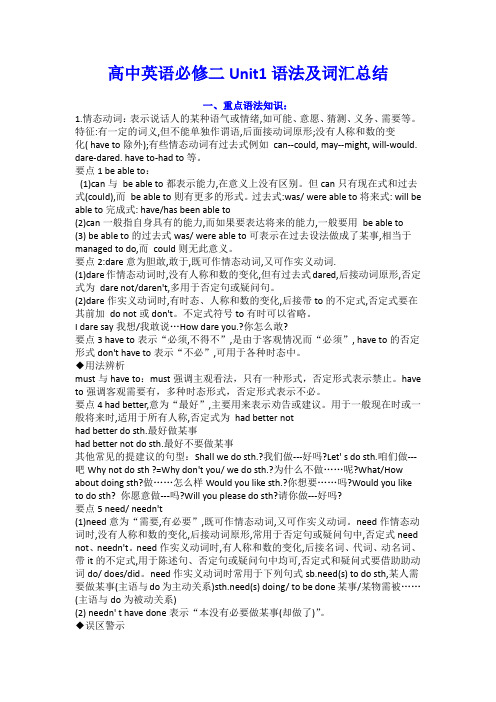
高中英语必修二Unit1语法及词汇总结一、重点语法知识:1.情态动词:表示说话人的某种语气或情绪,如可能、意愿、猜测、义务、需要等。
特征:有一定的词义,但不能单独作谓语,后面接动词原形;没有人称和数的变化( have to除外);有些情态动词有过去式例如can--could, may--might, will-would. dare-dared. have to-had to等。
要点1 be able to:(1)can与be able to都表示能力,在意义上没有区别。
但can只有现在式和过去式(could),而be able to则有更多的形式。
过去式:was/ were able to将来式: will be able to完成式: have/has been able to(2)can一般指自身具有的能力,而如果要表达将来的能力,一般要用be able to(3) be able to的过去式was/ were able to可表示在过去设法做成了某事,相当于managed to do,而could则无此意义。
要点2:dare意为胆敢,敢于,既可作情态动词,又可作实义动词.(1)dare作情态动词时,没有人称和数的变化,但有过去式dared,后接动词原形,否定式为dare not/daren't,多用于否定句或疑问句。
(2)dare作实义动词时,有时态、人称和数的变化,后接带to的不定式,否定式要在其前加do not或don't。
不定式符号to有时可以省略。
I dare say我想/我敢说…How dare you.?你怎么敢?要点3 have to表示“必须,不得不”,是由于客观情况而“必须”, have to的否定形式don't have to表示“不必”,可用于各种时态中。
◆用法辨析must与have to:must强调主观看法,只有一种形式,否定形式表示禁止。
2019新人教版高中英语必修第二册 Unit 1 单元同步语法总结(含练习题及答案)

介词的选择:
①根据和从句中动词的搭配
②根据和从句中形容词的搭配。
③根据和先行词的搭
④根据句意
注意:定语从句的谓语动词如果是以介词结尾的短语动词,则不可把介词移至从句之首。
如: look for, look after, pay attention to ,take care of , look forward to, listen to等。
The manwith whomItalked just now is from Beijing University.刚才和我谈话的那个人是从北京大学来的。(talk with sb和某人说话)
Yesterday I visited the West Lakefor whichHangzhou is famous.昨天我参观了杭州著名的西湖。(be famous for "以……而闻名".)
He built a telescope,through whichhe could study stars.
他架起一架望远镜,通过它可以研究星星。(through a telescope通过望远镜)
My computer,without whichI can’t play computer games, broke down yesterday.
补充三种特殊情况(供参考)
1.since when引导的定语从句
when指代前面句子所提供的时间背景,从句中多用现在完成时
That was in 1997,since whenthingshave beenbetter.
那是在1997年,从那时起情况就已经好转了。(ince when指代 since 1997)
必修2第1单元语法 高中英语必修课件
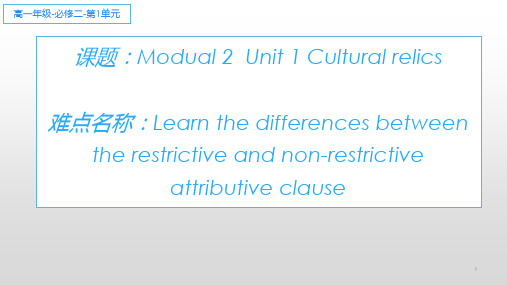
高一年级-必修二-第1单元
课题:Modual 2 Unit 1 Cultural relics
难点名称:Learn the differences between
the restrictive and non-restrictive attributive clause
1
目录
CONTENTS
导入
知识讲解
课堂练习 难点巩固
1. How should we deal with judgments(判断)on those who are treated unfairly?
We shouldn't make judgments which are just based on others' ideas. Instead, we should try to see the truth that is behind the appearance to avoid(以免) treating someone wrongly.
知识讲解 Learn the differences between the restrictive and non-restrictive attributive clause
难点突破
A: Nezha always makes trouble that/which causes the villagers' misunderstanding.
人教课标版英语必修二Unit1 语法课 the Use of Attributive Clause
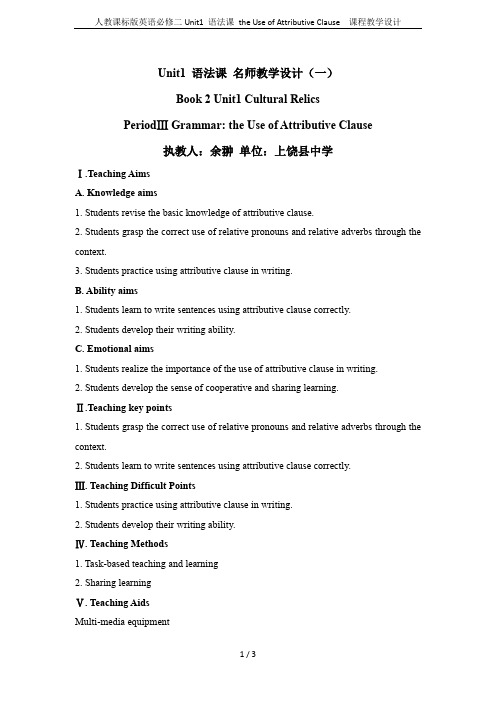
Unit1 语法课名师教学设计(一)Book 2 Unit1 Cultural RelicsPeriodⅢ Grammar: the Use of Attributive Clause执教人:余翀单位:上饶县中学Ⅰ.Teaching AimsA. Knowledge aims1. Students revise the basic knowledge of attributive clause.2. Students grasp the correct use of relative pronouns and relative adverbs through the context.3. Students practice using attributive clause in writing.B. Ability aims1. Students learn to write sentences using attributive clause correctly.2. Students develop their writing ability.C. Emotional aims1. Students realize the importance of the use of attributive clause in writing.2. Students develop the sense of cooperative and sharing learning.Ⅱ.Teaching key points1. Students grasp the correct use of relative pronouns and relative adverbs through the context.2. Students learn to write sentences using attributive clause correctly.Ⅲ. Teaching Difficult Points1. Students practice using attributive clause in writing.2. Students develop their writing ability.Ⅳ. Teaching Methods1. Task-based teaching and learning2. Sharing learningⅤ. Teaching AidsMulti-media equipmentⅥ. Teaching StepsStep1. Lead-inStudents enjoy a guessing game: try to guess what it is or who he/she is after seeing the pictures.1. He is the boy who is not tall but very cute and smart in our class.2. It is a kind of book which tells people the meaning of new words.3. She is a famous singer whose song Growing wild has become a hit.4. It is a day when Chinese people get together and eat mooncakes.Step2. DiscoveryStudents try to find out what the sentences above have in common.Step3: Revision of the knowledge of the attributive clauseAsk students two questions:1.What is the structure of attributive clause?2. How to choose the right relative pronouns and relative adverbs?Step4: Practice the use of the attributive clause in the contextTask1:choose from who / whom / that / which / whose correctly to fill the blanks of the text.This girl ________ is fond of smiling is my devoted friend, ____ eyes are small, beautiful and shiny. I often spend time chatting with her, with____ I can share joys and sorrows. In the past 10 years, she has given me many gifts, one of ______ is my favorite book,_______ cover is quite fine,______ shows her love for me. Practice:try to use attributive clause to describe anyone or anything you are familiar with. The relative pronouns should be chosen from who / whom / that / which / whose.Anyone: your parents / friends / teacher /… Anything: your pet / house / books /…Task2: choose from that(which) or where correctly to fill the blanks of the texts.1. We often pay a visit to places ________we show interest in. Every time the holiday we are eager for comes, we will choose some great museums ______ we can admire traditional and modern arts. And the scenes ______ we enjoyed staying together still remain in my heart.2. I like our school ______ the fragrance flows into the classroom in golden autumn.3. I hold a positive attitude towards life_____ we are very likely to meet difficulties.4. Now, we have reached a point in life _____ we have to make great efforts. Practice:try to use attributive clause to describe a concrete place or an abstract place. The relative word should be where. 具体地点名词university / park / restaurant /classroom /…模糊化的地点名词life /case / situation / stage / point…Task3: choose from that(which) or when correctly to fill the blanks of the texts.1. This photo was taken on her 22nd birthday_____ I was singing the birthday song for her. I still have vivid memories of the day_____ we had great fun together. The days___________ I spent with my best friend will never escape my memory.2.There was a time ____ I felt blue because my work received floods of negative opinions.3.It was books that save me from the bad feelings.4.The days are gone _____I was in low spirits.5.Now, occasions are quite few _____I am too angry to control myself as I become the master of my own emotions.Practice: try to use the following sentence patterns which contain attributive clause to describe your own experience.The relative words should be that or when.• I still have vivid memories of the day_____________________.• The days __________________will never escape my memory.• There was a time ___________________.• The days are gone__________________.• Occasions are quite few________________.Step5: Homework1.具体描述一件令人幸福或难过的事。
高一必修2unit1Grammar[课件]
![高一必修2unit1Grammar[课件]](https://img.taocdn.com/s3/m/21375636b4daa58da0114a28.png)
a) Rome, which is the capital of Italy, has a very long history.
罗马历史非常悠久,它是意大利的首都。 b) Yesterday I met Professor King, who came from the University of London. 昨天我遇见金教授,他从伦敦大学来的。
e. The house where we live is not large.
f. The house in which we live is not large.
g. The house which we live in is not large.
h. The house we live in is not large.
Those who have any difficulty with pronunciation should practise 2.只能用which,不用that的情况:
1.介词前置时关系代词只能用which(先行词为物) 2. 引导非限制性定语从句修饰某物或整个句子时只能用which
(1) She failed the exam, which made her parents vary angry.
that和which在指物的情况下一般都可以互换, 但在下列情况下, 一般用that而不用which。
(1) 先行词为all, everything, nothing, something, anything 等不定代词时。 I am sure she has something (that) you can borrow. (2)先行词被all, every, no, some, any, little, much等 修饰时。 I’ve read all the books that are not mine. (3)先行词被序数词或最高级修饰时。 This is the first book (that) he has read. (4)先行词被the only, the very, the same, the last修饰时。 This is the very book that belongs to him.
必修2unit1教案语法.doc
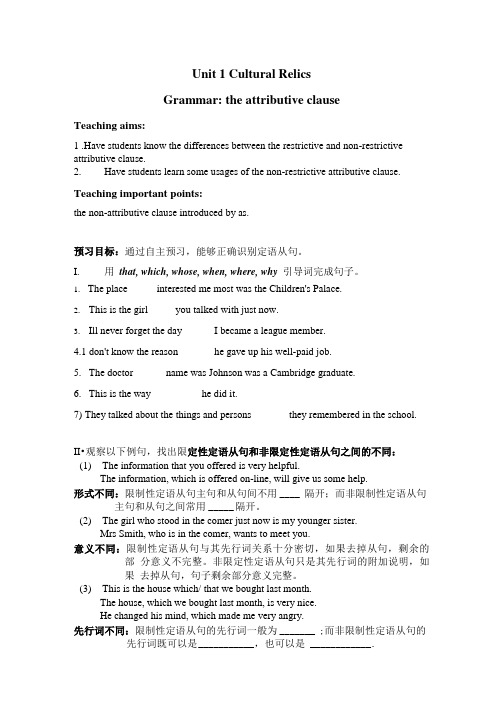
Unit 1 Cultural RelicsGrammar: the attributive clauseTeaching aims:1 .Have students know the differences between the restrictive and non-restrictive attributive clause.2.Have students learn some usages of the non-restrictive attributive clause. Teaching important points:the non-attributive clause introduced by as.预习目标:通过自主预习,能够正确识别定语从句。
I.用that, which, whose, when, where, why引导词完成句子。
1.The place ____ interested me most was the Children's Palace.2.This is the girl ____ you talked with just now.3.Ill never forget the day ______ I became a league member.4.1 don't know the reason ______ h e gave up his well-paid job.5.The doctor _____ name was Johnson was a Cambridge graduate.6.This is the way _________ he did it.7) They talked about the things and persons ______ they remembered in the school.II•观察以下例句,找出限定性定语从句和非限定性定语从句之间的不同:(1)The information that you offered is very helpful.The information, which is offered on-line, will give us some help.形式不同:限制性定语从句主句和从句间不用____ 隔开;而非限制性定语从句主句和从句之间常用_____ 隔开。
必修二第一单元语法教案(A Lesson plan for grammar on book 2 lesson 1)

A Lesson Plan for Grammar in Module 1 Book П执教学生:2013级英语专业本科2班周柳池Topic: Nouns Used as Verbs and the Future SenseContents:1. The grammar nouns used as verbs;2. The grammar will/be going to for future actions.Teaching Aims:1. To learn to use the words as verbs;2. To learn to use be going to or will;3. To learn to make sentences using the grammar in this lesson.Teaching Important Points:How to express your intention and prediction with will and be going to.Teaching Difficult Points:How to use a noun as a verb and how to use will and be going to correctly.Teaching Methods:1. Communicative Language Teaching;2. Task-based Language Teaching;3. Guided discovery method.Teaching Aids:A computer, some picture.Teaching Procedures:Step 1: Greetings (1 Min.)T: Good morning / afternoon, boys and girls!Ss: Good morning / afternoon, Mr. / Ms. Zhou!Step 2: Lead in (7 Mins.)1. Review the last lessons and check their homework (do a dictation about important phrases); (2 Mins.)2. Draw some stick figures and ask students to guess the meaning--to teach newwords in this way; (2 Mins.)3. Give some sentences on the blackboard, give some time to students for discussion and help the students to learn the new grammar. (2 Mins.)4. Announce the teaching plans in this lesson and begin our class. (1 Min.)Step 3: Grammar 1 (12 Mins.)1. Ask students to observe the sentences and find the difference; (2 Mins.)2. Explain the grammar to students in detail. (5 Mins.)3. Help students to do more exercises: (5 Mins.)Step 4: Grammar 2 (18 Mins.)1. Show some pictures about the behavior that will happen on the computer and invite some students to make sentences according to the picture; (2 Mins.)2. Ask students to turn to page seven and read the first 5 sentences carefully to find the difference between “will” and “be going to”; (3 Mins.)3. Explain the grammar in detail according to students’ answers; (4 Mins.)4. Ask students to tell their plan to their partner and write down one sentence on the notebook. And invite some students to write down their answers on the blackboard; (3 Mins.)5. Ask students to do exercises on page seven in order to check if they have already got it; (4 Mins.)6. Go over the lesson with class by retelling. (2 Mins.)Step 5: Homework (2 Mins.)Recite the grammar and finish the exercises on the textbook.T: Now, today’s homework is in our WORKBOOK. Turn to page 68 and finishExercise 4. Blackboard Design。
人教课标版英语必修二Unit1 语法课 课程教学设计
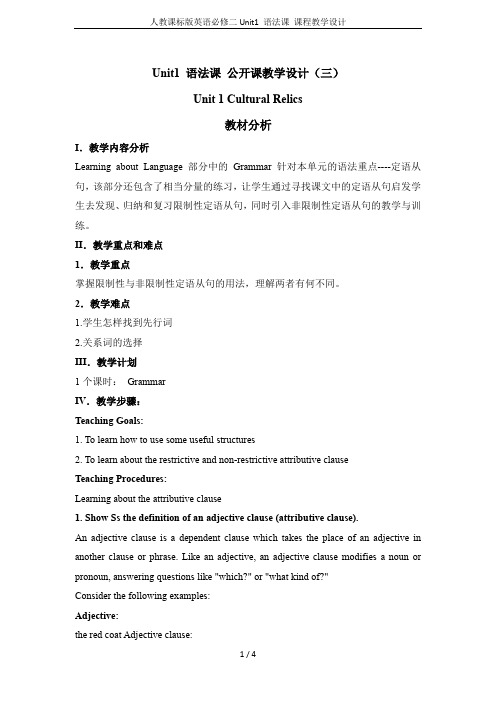
Unit1 语法课公开课教学设计(三)Unit 1 Cultural Relics教材分析I.教学内容分析Learning about Language 部分中的Grammar针对本单元的语法重点----定语从句,该部分还包含了相当分量的练习,让学生通过寻找课文中的定语从句启发学生去发现、归纳和复习限制性定语从句,同时引入非限制性定语从句的教学与训练。
II.教学重点和难点1.教学重点掌握限制性与非限制性定语从句的用法,理解两者有何不同。
2.教学难点1.学生怎样找到先行词2.关系词的选择III.教学计划1个课时:GrammarIV.教学步骤:Teaching Goals:1. To learn how to use some useful structures2. To learn about the restrictive and non-restrictive attributive clauseTeaching Procedures:Learning about the attributive clause1. Show Ss the definition of an adjective clause (attributive clause).An adjective clause is a dependent clause which takes the place of an adjective in another clause or phrase. Like an adjective, an adjective clause modifies a noun or pronoun, answering questions like "which?" or "what kind of?"Consider the following examples:Adjective:the red coat Adjective clause:the coat which I bought yesterdayLike the word “red”in the first example, the dependent clause “which I bought yesterday”in the second example modifies the noun “coat”.Note that an adjective clause usually comes after what it modifies, while an adjective usually comes before. In formal writing, an adjective clause begins with the relative pronouns “who(m),”“that”,or “which”.In informal writing or speech, you may leave out the relative pronoun when it is not the subject of the adjective clause, but you should usually include the relative pronoun in formal, academic writing.Informal:The books people read were mainly religious. Formal:The books that people read were mainly religious. InformalSome firefighters never meet the people they save. FormalSome firefighters never meet the people whom they save. More examples of adjective clauses:The meat which they ate was tainted.They're talking about the movie which made him cry.They are searching for the student who borrowed the book.Did I tell you about the author whom I met?2. Get Ss to tell whether the following pairs of sentences mean the same thing. (1) My uncle, who lives in London, is very rich. My uncle who lives in London is very rich.(2) The policies, which were unpopular, were rejected by the voters. The policies which were unpopular were rejected by the voters.(3) My niece, whose husband is out of work, will inherit the house, which I have always treasured. My niece whose husband is out of work will inherit the house, which I have always treasured.Suggested answers:The first sentence in each pair has a non-restrictive clause within two commas, and the second has a restrictive clause. A non-restrictive clause simply adds more information into the sentence and does not affect the meaning of the main clause: it istherefore bracketed off with commas(1a = an uncle who happens to live in London). Conversely, a restrictive clause defines its referent in the main clause more specifically and contributes significantly to the meaning of the sentence. Thus it is that particular uncle who lives in London who is referred to (1b). In 2a, all policies were unpopular and all were rejected, whereas in 2b only the policies that were unpopular were rejected. Note that in restrictive clauses the non-human relative pronoun is either 'that' or 'which', whereas for human referents the relative pronoun can be either 'who/m' or 'that' ( the man that/whom I will marry ...)3. Let Ss select one answer from the choices provided after each sentence.(1) As many children ___ came were given some cakes.A. thatB. asC. whoD. whom(2) The visitors saw rows of houses the roofs _____ are red.A. on whichB. of whichC. whereD. that(3) I usually take a nap after lunch, ______ is my habit.A. which itB. as itC. asD. that(4) Please tell me the way _____ you did the job.A. howB. whereC. whichD. in which(5) Is this museum ____ some German friends visited the day before yesterday?A. the oneB. whichC. thatD. where(6) The farmer uses wood to build a house ____ to store grain.A. in whichB. whereC. thatD. with which(7) I shall never forget the years _____ I spent in the country with the farmers, ____ has a great effect on my life.A. when; whichB. that; whichC. when; thatD. which; that(8) Little has been done ____ is helpful to our work.A. thatB. whatC. whichD. all that(9) Perhaps this is the only market ____ you can get such cheap goods.A. thatB. of whichC. by whichD. where(10) We'll put off the outing until next week, ____ we won't be so busy. A. whenB. whichC. at whichD. in that Suggested Answers:(1) B (2) B (3) C (4) D (5) A (6) A (7) B (8) A (9) D (10)A4. Ask Ss to finish Ex3 (P4) and Ex4(P4)Suggested Answers:Ex3:1.Here are the farmers who discovered the underground city last month.2. Hangzhou is famous city in China, where many people come to buy tea.3.I don’t know the reason why she got so angry.4. The old man, whom you are talking to, saw some Germans taking apart the Amber Room and removing it.5.The woman remembered the day when she saw Nazis burying something near her home.6.St Petersburg is a very beautiful city, which was once called Leningrad.7.I remember the soldier who told me not to tell anyone what I had seen.8.The soldiers moved the boxes to a mine, where they wanted to hide them.9.Xi’an is one of the few cities whose city walls remain as good as before.10.Shanxi Province is a place whose/where cultural relics are well looked after.Ex4:1. whose daughter studies in a key university2. who discovered the Terracotta Warriors3. which was decorated with valuable jewels4. where she can learn about former dynasties5. which was drawn by a famous artist in the Tang Dynasty6. which is very beautiful7. when we get together to celebrate8. that I can’t remember9. which is known for its good food10. when the weather was warm and sunny。
人教课标版高中英语必修2 Unit1_语言点课名师教学设计
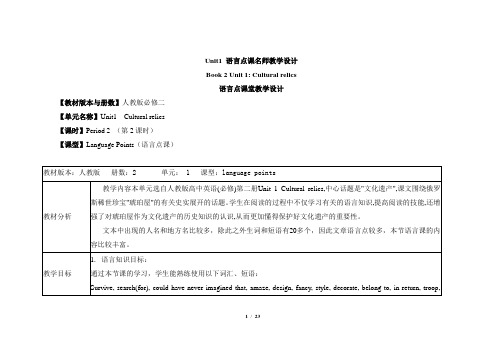
2. the problems of language points in the text of In search of the Amber Room;
3. any other problems of language points relevant to the text.
文本中出现的人名和地方名比较多,除此之外生词和短语有20多个,因此文章语言点较多,本节语言课的内容比较丰富。
教学目标
1.语言知识目标:
通过本节课的学习,学生能熟练使用以下词汇、短语:
Survive, search(for), could have never imagined that, amaze,design, fancy, style, decorate, belong to, in return, troop, serveas, have sth done, add, the way she wanted, light, consider, wonder, remove, there is no doubt, at war, less than, remain, former, worth
amazed adj感到惊奇的
amazing adj令人吃惊的
amazement n惊奇
amazingly adv令人惊奇的是
amaze sb使某人惊奇
It amazed me to hear that you were leaving.
be amazed at/by对----大为惊奇
We were amazed at his rapid recovery.
S: ...
人教版新课标高中英语 2019-2020学年 必修二 第一单元 unit 1 reading In Search of the Amber Room

Detailed reading Para 5: How was a new Amber Room built?
when who how
why
2003 the Russians and Germans
by studying old photos of the former Amber Room to celebrate the 300th birthday of their city
_____ th1e3 Amber Room
Who were mentioned in these years?
Time (when)
Character (who)
Unknown In 1716 In 1770
Frederick I
Frederick William I & Peter the Great
Time order.
?
1716 1770 1941 2003
Who were mentioned in these years? What did they do to the Amber Room?
12
Who were mentioned in these years? What did they do to the Amber Room?
•amber (several tons) •gold •jewels
10 years
11
Detailed reading
Read Paras. 2-5 and answer the following questions.
In what order is the passage developed?
later
Catherine II
上外版2020高中英语必修第二册unit 1单元语法课件(定语从句之关系代词关系副词用法)
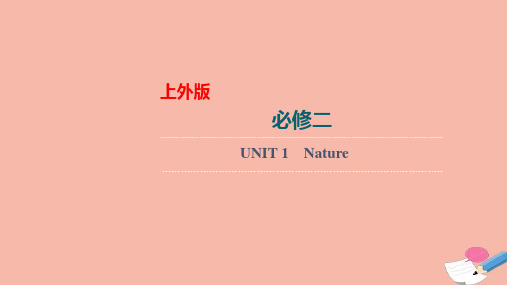
It was an age ____ we had no phones.
when
先行词为抽象时间: age(年代);occasion(机会场合);interval(间隔); stay(逗留时间)
where 指地点(=介词+which)
Lin tong is a very beautiful place ____ archaeologist found the Terracotta Warriors
every age group.
定语从句中的术语
先行词 关系词
关系代词 关系副词
了解定语从句(一) -关系代词
关系代词
who/ whom/that which/ that whose as
关系词在从句中的成分
1. He is the man who/that teaches us English. 2. He is the teacher who/that/whom we want to visit. 3. This is an interesting book which/that he gave me. 4. The glory king is a game which/that is suitable for
➢ 当先行词被so, such, the same修饰时,此时关 系代词用as引导且不能省略。
The city was attacked by ____su_ch___ terrible
weather ____as_____ few citizens had ever
experienced before.
He is such a kind man _____all of us like him.
必修二第一单元语法点
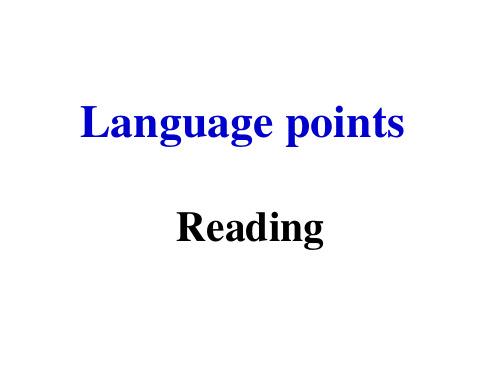
10. remove v. 移动, 搬开 Please remove your shoes before coming in. 进屋前请脱鞋。 The doctor tried to remove the patient's fear. 那医生尽力地消除病人的恐惧。 remove… from… 把…从某处移开 Please remove your bag from the seat so that I can sit down. 请把你的包从座位上拿走那样我就可以坐下。
6. belong to
属于; 是…的成员/一部分; 同…有关
(只能用于主动语态)
This is my pen. = This pen belongs to me.
All the cultural relics belong to all the
mankind.
这桌上所有的书都是属于他的. All the books on the desk belong to him.
=We have no doubt about/of sth.
There is no doubt about/of his honesty.
There’s no need(需要) to do / for sth / sb. eg.There is no need to buy the book now. There’s no possibility(可能性) that… (It’s) no wonder (that)… 难怪… ----He left his cellphone in the office. ----No wonder he couldn’t find it at home.
5. style n. 风格, 风度, 类型 He has developed his own style of writing. in … style in the style of … 以……的风格 in the fancy style 以奇特的风格 He bought a painting in the style of Picasso. 他买了一幅毕加索风格的画. 我喜欢他的办事风格。 I like his style/way of doing things.
人教版新课标高中英语必修二 Unit 1 知识点明细

人教版新课标高中英语必修二Unit 1 知识点明细Unit 1Cultural relicsPart 11. have to 强调客观条件的制约而“不得不”。
must 表主观上认为“必须”否定形式是don’t have to和needn’t,不必。
mustn’t是禁止。
2. rare 珍贵的, 稀有的Snow is quite rare in this area。
rarely与hardly, seldom位于句首时,句子用部分倒装语序。
Rarely do we see them nowadays.Hardly had he got home when he began to cook.3. survive survival n. 生存,幸存;survivor n. 幸存者,生还者vi.活下来,幸存Of the 6 people injured in the crash, only 2 survived.Vt. (1) survive sth.幸免于,经历...仍活着(2) survive sb by+时间.比...活得长The company managed to survive the crisis(危机)The old lady survived her husband by ten years.4.in search of =in the/one’s search for 寻找search for 寻找search for my booksearch sb./sp for sth.搜查某人/某地以找到Scientists are in search of a cure for the disease.in need of 需要in favor of 支持in terms of在…方面;就…而言in view of 鉴于,考虑到in danger of 处于危险中in fear of唯恐in case of 以防in charge of 掌管,负责in place of 取代,代替in praise of 为了表扬in memory of为了纪念in honor of 为了纪念;为了庆祝;为了表示敬意5. amaze ( amazing , amazed, amazement) vt.使吃惊sth amaze sb→sb be amazed by/at/with sthto one’s amazement look at sb in amazement【比较】surprise , astonish , amaze6. design vt.design sth for sb→sth be designed for sb为…而设计/准备,打算用作be designed to do ... 目的是by design=on purpose故意(反)by chance/accident偶然地The experiment is designed to test the new drug.The films designed for adults aren’t fit for children.7. fancy (1).adj. 别致的,奇特的These clothes are too fancy for me.(2). vt. 想象,设想;爱好fancy doing sthI can’t fancy h is doing such a thing.Do you fancy a glass of coffee? I don’t fancy walking in the rain.(3).n. 喜爱have a fancy for 爱上…,对…入迷8. decorate vt. 装饰,装潢,点缀,装点decoration n.decorate sth with… 用...装点.→be decorated withThe students are decorating their classroom with flowers and balloons.The classroom is decorated with flowers and balloons.9. jewel 【C.】a jewel 一件珠宝,引申为“受重视的人或物”jewellery 【U.】a piece of jewellery 一件首饰10. belong to 不用于进行时态和被动语态,作定语用v-ingbelongings n. 财产,所有物Put the book back where it belongsOur headmaster keeps telling us that the future ____ the well-prepared.A. belongs toB. is belonged toC. is belonging toD. will be belonged toAs is known to us all, America is a developed country___ the First World. A. belonging B. belonged C. belonging to D. belonged to11. in return/reward for作为...对回报in turn依次,轮流= by turns;转而,反过来Can I buy you lunch in return for your help?Theory is based on practice and in turn serves practice.12. at war 在战争中,交战中at表状态The two countries have been at war for 5 years.at peace/at work/ at play /at school/at table /at breakfast/Part 21. remove the mountain / hat / sb’s doubts / be removed from office(school)移走;脱去;消除;免职,离去I can’t _____ the dirty points from my shirt.2. less than少于rather than而不是more than超过,不仅仅,非常other than除了There is nobody here other than me.The teacher, rather than his students, has been invited.3 doubt n. / vt. 怀疑,疑惑beyond / without doubt 无疑地;必定I doubt whether / if he will comeThere is no doubt that he is right. / I don’t doubt that…There is some doubt whether it is true. (同位语从句)There is no chance/possibility that…不可能There is no need to do…没必要There is no point/sense in doing sth没有意义4. remain link.v 保持是,仍是remain silent/a farmer/ seated/sitting/at homesth remains to be done.It remains to be seen whether her colleagues will agreevi. 剩下,留下remaining /left 剩下的the remaining money / the money leftkeep /remain /staykeep 对原状态的继续和维持keep quiet/keep calm/keep healthy/fit remain周围事物离开或发生变化后,主语仍停留或保持某状态stay 处于静止状态stay awake /stay still5. the former view/boss the former…the latter…前者…后者Of the two plans the latter is better than the former6. be (well) worth n / doing (主动表被动)be worthy of n / of being done /to be doneIt is worthwhile +to do sth. / doing sth.The book is worth reading. The place is worthy of a visit. The book is worthy of being read. The book is worthy to be read. This is a house worth $50,000.7. local adj./n.=native 本地的;本地人8. apart adv.分离,不在一起;相隔/距We are living apart now. The two houses are 500 meters apart. take apart拆开/卸tell apart 辨别,区分apart from 除…之外put/set sb apart from sb 使…显得优越或独特The little boy took the clock apart to find out how it worked.His use of language sets him apart from other modern writers.9. prove+ n./ clause/sb (to be)adj./n vt.We have proved our courage in battle. He proved himself to be honest.Franklin’s experiment proved that lightning and electricity are the same.link. v+ (to be) + adj. /n.结果是,证明是What he said proved (to be) right.=turn out10. evidence Un.证据,证词;痕迹,迹象; 明显/白It is evident/clear/obvious that…很显然11. trial n.审判;试验be on trial在试验/审判中trial and error 反复试验,不断摸索undergo(stand)trial受审判12. agree with + sb./sb’s words/what sb. said/sb’opinionagree to+ plan /arrangement /decisionagree on在某方面达成一致The damp weather doesn’t agree with me.13. think(speak) highly/well/much of 高度评价think badly/poorly/little/ill of 对…评价低think nothing of it别在意/客气,没什么(交际);不把…当一回事,觉得…无所谓She thinks nothing of walking thirty miles a day.14. debate vt./vi./n. under debate/hold a debatedebate with sb about sth.Part 3 Summing Up【词汇】rare valuable survive dynasty amaze amazing select design fancy style decorate jewel artist belong troop reception remove wooden doubt former worth local apart painting castle trial evidence explode entrance sailor informal debate【重点词组】in search of belong to in returnless than at war take apart think highly of【语法】定语从句(Ⅲ)1.限制性定语从句In 1770 the room was completed the way she wanted.This was a time when the two countries were at war.2.非限制性定语从句This gift was the Amber Room, which was given this name because several tons of amber were used to make it.。
高中英语 Unit1 Grammar课件 新人教版必修2

Jane has been to the Great Wall. It is in China.
Jane has been to the Great Wall which/that is in China.
I showed him the amber. I received it this morning
The boy whose parents are woking outside was brought up by his grandfather.
the boy’s =whose
关系词 whose 实际上是先行词的所有格
先行词和关系词的关系 Join the following sentences:
关系代词的实质
Join the following sentences:
The girl is Mary. We saw her yesterday.
her
The girl
we saw yesterday is Mary.
关系代词的实质 Join the following sentences:
study.
This is our school where we study.
Do you know the room? It is made of amber.
Do you know the room which is made of amber?
I have read the newspaper. It carries the important news.
(4). You are talking to the old man who saw some Germans taking apart the Amber Room and removing it.
人教课标版英语必修二Unit1 语法课 课件 (共18张PPT)

Practice who / whom / which / that / whose
Anyone: your parents / friends / teacher /… Anything: your pet / house / books /…
that / which or where
We often pay a visit to places _th_a_t_/w__h_ic_h__ we both show interest in.
angry to control myself as I become the master of my own emotions.
Practice : that/which or when
• I still have vivid memories of the day _______________________________.
This girl _w__h_o_/_th_a_t_ is fond of smiling is my devoted friend, _w_h_o_s_e_ eyes are small, beautiful and shiny. I often spend time chatting with her, with_w__h_o_m_ I can share joys and sorrows. In the past 10 years, she has given me many gifts,one of _w_h_i_c_h_ is my favourate book,_w__h_o_s_e_ cover is quite fine, _w_h_ic_h__shows her love for me.
• The days _____________________will never escape my memory.
【2025人教版英语复习讲义-语法专题】必修第二册 Unit 1 Cultural Heritage

速记 词汇句型背诵
8 conduct
9 attempt 10 worthwhile 11 download
n.行为;举止;管理方法 vt.组织;安排;带领 n.& vt.企图;试图;尝试 adj.值得做的;值得花时间的
vt.下载 n.下载;已下载的数据资料
速记 词汇句型背诵
12 entrance 13 process 14 overseas
速记 词汇句型背诵
17 historic →history →historian →historical
adj.历史上著名(或重要)的;有史时期的 n.历史 n.历史学家 adj.(有关)历史的;历史上的
速记 词汇句型背诵
18 comparison →compare
19 identify →identity →identification
adj.闪烁的;闪耀的;起泡的
10 mysterious /mɪ'stɪəriəs/
adj.神秘的;神奇的;诡秘的
速记 词汇句型背诵
Ⅳ.背核心短语
1 take part in 2 give way to 3 keep balance 4 lead to 5 make a proposal
参与(某事);参加(某活动) 让步;屈服 保持平衡 导致 提出建议
速记 词汇句型背诵
Ⅱ.重点单词——记形
1 mount
2 former 3 preserve
n.山峰 vt.爬上;骑上 vi.爬;登上 adj.以前的;(两者中)前者的
vt.保存;保护;维持 n.保护区
速记 词汇句型背诵
4 likely
5 department 6 within 7 issue
人教课标版高中英语必修2 Unit1_语法课_名师教学设计(一)

Unit1 语法课名师教学设计(一)Book 2 Unit1 Cultural RelicsPeriodⅢ Grammar: the Use of Attributive ClauseⅠ.Teaching AimsA. Knowledge aims1. Students revise the basic knowledge of attributive clause.2. Students grasp the correct use of relative pronouns and relative adverbs through the context.3. Students practice using attributive clause in writing.B. Ability aims1. Students learn to write sentences using attributive clause correctly.2. Students develop their writing ability.C. Emotional aims1. Students realize the importance of the use of attributive clause in writing.2. Students develop the sense of cooperative and sharing learning.Ⅱ.Teaching key points1. Students grasp the correct use of relative pronouns and relative adverbs through the context.2. Students learn to write sentences using attributive clause correctly.Ⅲ. Teaching Difficult Points1. Students practice using attributive clause in writing.2. Students develop their writing ability.Ⅳ. Teaching Methods1. Task-based teaching and learning2. Sharing learningⅤ. Teaching AidsMulti-media equipmentⅥ. Teaching StepsStep1. Lead-inStudents enjoy a guessing game: try to guess what it is or who he/she is after seeing the pictures.1. He is the boy who is not tall but very cute and smart in our class.2. It is a kind of book which tells people the meaning of new words.3. She is a famous singer whose song Growing wild has become a hit.4. It is a day when Chinese people get together and eat mooncakes.Step2. DiscoveryStudents try to find out what the sentences above have in common.Step3: Revision of the knowledge of the attributive clauseAsk students two questions:1.What is the structure of attributive clause?2. How to choose the right relative pronouns and relative adverbs?Step4: Practice the use of the attributive clause in the contextTask1:choose from who / whom / that / which / whose correctly to fill the blanks of the text.This girl ________ is fond of smiling is my devoted friend, ____ eyes are small, beautiful and shiny. I often spend time chatting with her, with____ I can share joys and sorrows. In the past 10 years, she has given me many gifts, one of ______ is my favorite book,_______ cover is quite fine,______ shows her love for me. Practice:try to use attributive clause to describe anyone or anything you are familiar with. The relative pronouns should be chosen from who / whom / that / which / whose.Anyone: your parents / friends / teacher /… Anything: your pet / house / books /…Task2: choose from that(which) or where correctly to fill the blanks of the texts.1. We often pay a visit to places ________we show interest in. Every time the holiday we are eager for comes, we will choose some great museums ______ we can admire traditional and modern arts. And the scenes ______ we enjoyed staying together still remain in my heart.2. I like our school ______ the fragrance flows into the classroom in golden autumn.3. I hold a positive attitude towards life_____ we are very likely to meet difficulties.4. Now, we have reached a point in life _____ we have to make great efforts. Practice:try to use attributive clause to describe a concrete place or an abstract place. The relative word should be where. 具体地点名词university / park / restaurant /classroom /…模糊化的地点名词life /case / situation / stage / point…Task3: choose from that(which) or when correctly to fill the blanks of the texts.1. This photo was taken on her 22nd birthday_____ I was singing the birthday song for her. I still have vivid memories of the day_____ we had great fun together. The days___________ I spent with my best friend will never escape my memory.2.There was a time ____ I felt blue because my work received floods of negative opinions.3.It was books that save me from the bad feelings.4.The days are gone _____I was in low spirits.5.Now, occasions are quite few _____I am too angry to control myself as I become the master of my own emotions.Practice: try to use the following sentence patterns which contain attributive clause to describe your own experience.The relative words should be that or when.• I still have vivid memories of the day_____________________.• The days __________________will never escape my memory.• There was a time ___________________.• The days are gone__________________.• Occasions are quite few________________.Step5: Homework1.具体描述一件令人幸福或难过的事。
- 1、下载文档前请自行甄别文档内容的完整性,平台不提供额外的编辑、内容补充、找答案等附加服务。
- 2、"仅部分预览"的文档,不可在线预览部分如存在完整性等问题,可反馈申请退款(可完整预览的文档不适用该条件!)。
- 3、如文档侵犯您的权益,请联系客服反馈,我们会尽快为您处理(人工客服工作时间:9:00-18:30)。
Revision
6. Is it the reason _____ you were late? why 7. October 1st is the date when China celebrates its _____ National Day. where 8. We walked in a garden _____ many trees and flowers had been planted. 9. This is the island _____ I lived for two years. where 10. 2001-2005 are the years _____ I studied in the when university.
Doing
7. This was a time when the two countries were at war. 8. There is no doubt that the boxes were then put on a train for , which was at that time a German city on the Baltic Sea. 9. In 2003 it was ready for the people of St Petersburg when they celebrated the 300th birthday of their city.
Unit 1 Cultural relics Period 2 Grammar
I. Warming up
Look at the parts in red. Do you know what kind of clauses they are? ? • The gift was the Amber Room, which was given this name because several tons of amber were used to make it. • It was also a treasure decorated with gold and jewels, which took the country’s best artists about ten years to make. • In 2003 it was ready for the people of St Petersburg, when they celebrated the 300th birthday of their city.
Comparing
限制性定语从句 表意 功能 与主句语意关系 紧凑, 紧凑,定语从句 不能删除 修饰先行词 无逗号与主句分开 使用时可以用 that引导 引导 非限制性定语从句 与主句语意关系松散, 与主句语意关系松散, 定语从句可以删除
修饰先行词或整个句子 有逗号与主句分开 使用时不能用that引导 引导 使用时不能用
Restrictive: 2, 6, 7, 9 Non-restrictive: 1, 3, 4, 5, 8
Doing
Look at the following sentences and tell the differences of the Attributive Clauses. 1. He gave me a pen he bought yesterday. 2. He gave me a pen, which he bought yesterday. • 关系代词在限制性定语从句中作宾语时可 以省略。 以省略。 • 关系代词在非限制性定语从句中作宾语不 可以省略。 可以省略。
Practising
6. Hangzhou is a famous city in China. Many people come to buy tea in that city. Hangzhou is a famous city in China, where many people come to buy tea. 7. The old man saw some Germans taking apart the Amber Room and removing it. You are talking to an old man. The old man, who you are talking to, saw some Germans taking apart the Amber Room and removing it. / You are talking to the old man who saw some Germans taking apart the Amber Room and removing it.
Practising
3. I remember the soldier. He told me not to tell anyone what I had seen. I remember the soldier who told me not to tell anyone what I had seen. 4. The soldiers moved the boxes to a mine. They wanted to hide them. The soldiers moved the boxes to a mine, where they wanted to hide them. 5. Shaanxi Province is a place with many cultural relics. They are well looked after. Shaanxi Province is a place whose/where cultural relics are well looked after.
V. Practising
Choose the best answer. 1. Do you remember the deer farm C we visited two months ago? A. why B. when C. that D. how 2. Anyway, that evening, ______ I’ll tell you more D about later, was really terrible. A. when B. where C. that D. which
Revision
What do Attributive Clauses do? • 作用相当于形容词; • 提供人或事物更详细的信息; • 简化语言,避免使用两个简单句时重复的内容。 What do they look like? 由关系代词which/that或关系副词when, where, why等引导; 也可以用介词+关系代词引导。 Where do they come in sentences? 在所修饰的先行词之后。
II. Revision
Fill in the blanks with proper relative pronouns or adverbs. who/that 1. Look at the girl ________ is singing so beautifully. 2. Do you know the woman to whom our teacher ______ is talking? whose 3. Jim is the boy ______ hat is red. 4. He gave me a pen ___________ he bought last that/which week. 5. Mary has read all the books _________ I lent that/which her.
Practising
3. John said he’d been working in the lab for an hour, ______ was true. B A. that B. which C. who D. what 4. Anne always spoke highly of her colleagues in the movie, ______, of course, made the others very happy. B A. who B. which C. that D. what 5. Chongqing is the city ______ she lived when she was A young. A. where B. which C. when D. how 6. Do you know the reasons ______ he came back? D A. how B. which C. that D. why
Doing
3. It was also a treasure decorated with gold and jewels, which took the country’s best artists about ten years to make. 4. However, the next King of Prussia, Frederick William I, to whom the Amber Room belonged, decided not to keep it. 5. Later, Catherine II had the Amber Room moved to a palace outside St Petersburg, where she spent her summers. 6. In 1770 the room was completed the way she wanted.
形式
IV. Doing
Read the passage again and underline all the sentences with attributive clauses and the words or sentences they modify. 1. This gift was the Amber Room, which was given this name because several tons of amber were used to make it. 2. The amber which was selected had a beautiful yellow-brown colour like honey.
